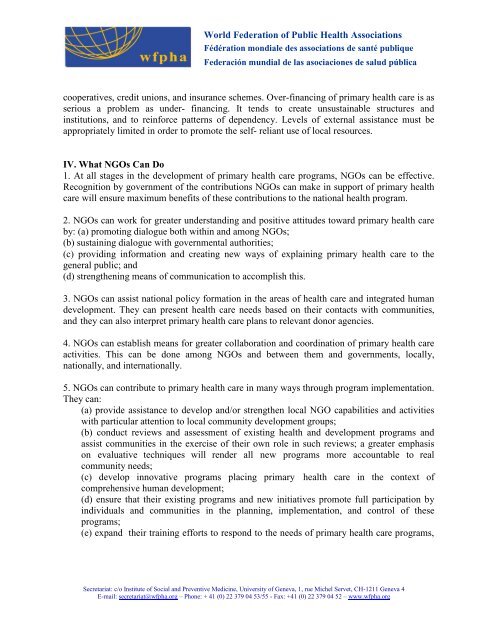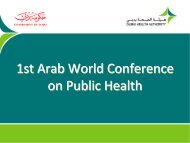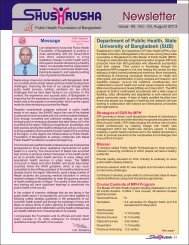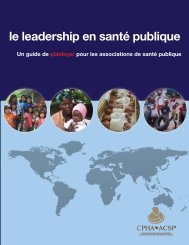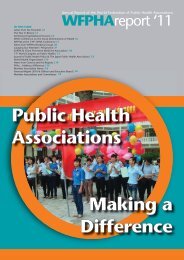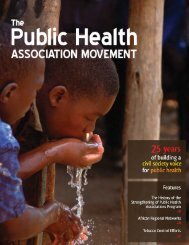Non-Governmental Organizations and Primary Health Care - World ...
Non-Governmental Organizations and Primary Health Care - World ...
Non-Governmental Organizations and Primary Health Care - World ...
You also want an ePaper? Increase the reach of your titles
YUMPU automatically turns print PDFs into web optimized ePapers that Google loves.
<strong>World</strong> Federation of Public <strong>Health</strong> AssociationsFédération mondiale des associations de santé publiqueFederación mundial de las asociaciones de salud públicacooperatives, credit unions, <strong>and</strong> insurance schemes. Over-financing of primary health care is asserious a problem as under- financing. It tends to create unsustainable structures <strong>and</strong>institutions, <strong>and</strong> to reinforce patterns of dependency. Levels of external assistance must beappropriately limited in order to promote the self- reliant use of local resources.IV. What NGOs Can Do1. At all stages in the development of primary health care programs, NGOs can be effective.Recognition by government of the contributions NGOs can make in support of primary healthcare will ensure maximum benefits of these contributions to the national health program.2. NGOs can work for greater underst<strong>and</strong>ing <strong>and</strong> positive attitudes toward primary health careby: (a) promoting dialogue both within <strong>and</strong> among NGOs;(b) sustaining dialogue with governmental authorities;(c) providing information <strong>and</strong> creating new ways of explaining primary health care to thegeneral public; <strong>and</strong>(d) strengthening means of communication to accomplish this.3. NGOs can assist national policy formation in the areas of health care <strong>and</strong> integrated hum<strong>and</strong>evelopment. They can present health care needs based on their contacts with communities,<strong>and</strong> they can also interpret primary health care plans to relevant donor agencies.4. NGOs can establish means for greater collaboration <strong>and</strong> coordination of primary health careactivities. This can be done among NGOs <strong>and</strong> between them <strong>and</strong> governments, locally,nationally, <strong>and</strong> internationally.5. NGOs can contribute to primary health care in many ways through program implementation.They can:(a) provide assistance to develop <strong>and</strong>/or strengthen local NGO capabilities <strong>and</strong> activitieswith particular attention to local community development groups;(b) conduct reviews <strong>and</strong> assessment of existing health <strong>and</strong> development programs <strong>and</strong>assist communities in the exercise of their own role in such reviews; a greater emphasison evaluative techniques will render all new programs more accountable to realcommunity needs;(c) develop innovative programs placing primary health care in the context ofcomprehensive human development;(d) ensure that their existing programs <strong>and</strong> new initiatives promote full participation byindividuals <strong>and</strong> communities in the planning, implementation, <strong>and</strong> control of theseprograms;(e) exp<strong>and</strong> their training efforts to respond to the needs of primary health care programs,Secretariat: c/o Institute of Social <strong>and</strong> Preventive Medicine, University of Geneva, 1, rue Michel Servet, CH-1211 Geneva 4E-mail: secretariat@wfpha.org – Phone: + 41 (0) 22 379 04 53/55 - Fax: +41 (0) 22 379 04 52 – www.wfpha.org


